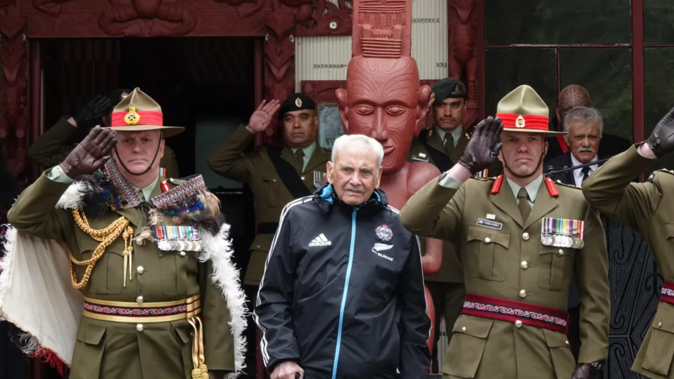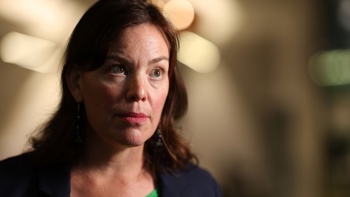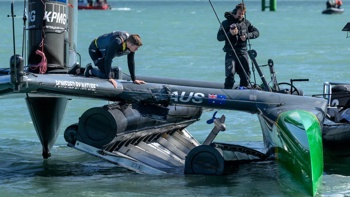
By RNZ
Immense pride and a long-overdue sense of closure has dominated an emotional medal ceremony at the Treaty Grounds in Waitangi.
A total of 78 sets of medals were given out on Saturday - mostly earned by members of the legendary 28th Māori Battalion and presented to the soldiers’ descendants, as part of a campaign to recognise those who had not been honoured in their lifetimes.
Many whānau carried photos of their late fathers, uncles and grandfathers as they were called forward to receive the decorations.
While the majority of those honoured were men who served during World War II, also included were veterans of World War I and later conflicts such as the Malayan Emergency, and a few women.
Rhonda Lepper, of Auckland, had already collected her father’s unclaimed medals at a similar ceremony in Gisborne two years ago.
She was stunned to learn her mother Mary Cairns, a Māori nurse who served as a hospital matron in Papakura in World War II, was also owed medals.
/cloudfront-ap-southeast-2.images.arcpublishing.com/nzme/PJRX3JE4RVG73IIPHBNP2BQZDM.png)
Rhonda Lepper and her mokopuna RNZN Ensign Jett Hunia with Chief of Army Major General John Boswell. Photo / RNZ, Peter de Graaf
She travelled to Waitangi with her granddaughter, an ensign in the Royal New Zealand Navy, to take part in the ceremony.
“We were absolutely floored, but thoroughly thrilled when we found out Mum had medals as well,” Lepper said.
She had no idea why her parents had not applied for their medals during their lifetimes.
She only found out when she got a phone call from David Stone, the Auckland-based lawyer driving the medal campaign.
“But it means a lot. We’re very proud of them and their achievements,” she said.
“It’s very emotional being here at Waitangi. I cried. I didn’t cry at my Dad’s ceremony but I did at Mum’s. I guess it’s because this is where the boys [of the 28th Māori Battalion] left from in 1940. I just felt it.”
Also feeling the emotion was the Kaire whānau, originally from Ngāraratunua, near Whangārei.
Of the three Kaire brothers who went to war, only one, John Kaire, returned.
/cloudfront-ap-southeast-2.images.arcpublishing.com/nzme/UT5HTJ2RUVBZZDDBRQZB7E6C5M.png)
The Kaire whānau said they were proud to accept medals earned by their tūpuna John Kaire. Photo / RNZ, Peter de Graaf
John Kaire junior, of Waiuku, believed his father did not want his medals because he was devastated by the loss of his two older brothers and disillusioned by the war.
“He didn’t want the medals originally. When we were kids we wanted him to be honoured with them. Now we have the chance to accept them, and what an honour it is for us,” he said.
Another son, Laurance Kaire, of Hakaru, near Mangawhai, said taking part in the ceremony was an honour.
/cloudfront-ap-southeast-2.images.arcpublishing.com/nzme/2SQ3Z4PUV5HR3E4ZNH3G252BAQ.png)
The ceremony was held in front of Te Whare Rūnanga at the Treaty Grounds in Waitangi. Photo: RNZ / Peter de Graaf
“The mana and wairua we’re getting from these medals is awesome. It’s just sad he’s not here to receive the medals with us. I miss my dad. It’s been 25 years but I miss him heaps. It’s a privilege to be here.”
An estimated 800 people took part in the ceremony, including Chief of Army, Major General John Boswell, and Tā (Sir) Robert “Bom” Gillies, the last surviving member of the 28th Māori Battalion.
Gillies will turn 99 in February.
/cloudfront-ap-southeast-2.images.arcpublishing.com/nzme/53EBLOPBXNCP7ALNXHULETZWGA.png)
Malaya vet Peter Pangari, of Dargaville, shares a hongi with Tā (Sir) Robert "Bom" Gillies, last surviving member of the 28th Māori Battalion. Photo / RNZ, Peter de Graaf
Stone told the crowd at the Treaty Grounds the project started one evening while he was having kai with his father, prompted by a photo of his uncle - a soldier in the Māori Battalion - next to the table.
“I asked a simple question of my dad: ‘Where’s uncle’s medals?’ And he just said to me: ‘Find out boy’. So I did.”
That triggered a long quest and a huge amount of research that expanded from his uncle to his uncle’s village and eventually the entire country.
The Defence Force’s Personnel Archives and Medals Unit eventually got on board, and Stone tracked down 551 servicemen and women who had never received their medals.
Saturday’s ceremony at Waitangi was the seventh so far around the country.
Stone said the rules of the time stipulated that soldiers had to apply for their medals, which were then posted out to them.
However, many never applied because they felt those who really deserved medals had been left behind on the battlefields of Europe and North Africa.
/cloudfront-ap-southeast-2.images.arcpublishing.com/nzme/444H4VBQ6NDBJC6NMLCZYW4OKM.png)
From left, Sir Robert "Bom" Gillies, Chief of Army Major-General John Boswell and Bernard Henare face the second of three challenges as they approach Te Whare Rūnanga. Photo / RNZ, Peter de Graaf
Others, just back from the war with their lives turned upside down, had other things on their minds.
“A lot of them just wanted normality. To settle down and get a job and get on with things,” Stone said.
“At that time medals probably wouldn’t have been the highest thing on their priority list.”
Many applied only decades later, after being asked by their mokopuna, or because they wanted their moko to know what they had done in the war.
Others were legally too young to fight when they signed up, so enlisted in other towns and gave false addresses - making them hard to trace once they had returned home.
/cloudfront-ap-southeast-2.images.arcpublishing.com/nzme/IH3VT2GL35HKPFFGB4GR4YYPRA.png)
Students of the Whangārei-based Leadership Academy of A Company perform a haka to conclude the ceremony. Photo/ RNZ, Peter de Graaf
Stone said he felt the same way as the whānau who received medals on Saturday.
“It’s incredibly emotional, but therein lies the reward. To see what it means for people, and to know you’ve helped provide some sort of closure for them, and you’ve helped bridge some sort of connection,” he said.
“These medals are a physical, tangible link to their dads. It’s been very rewarding.”
- RNZ
Take your Radio, Podcasts and Music with you









